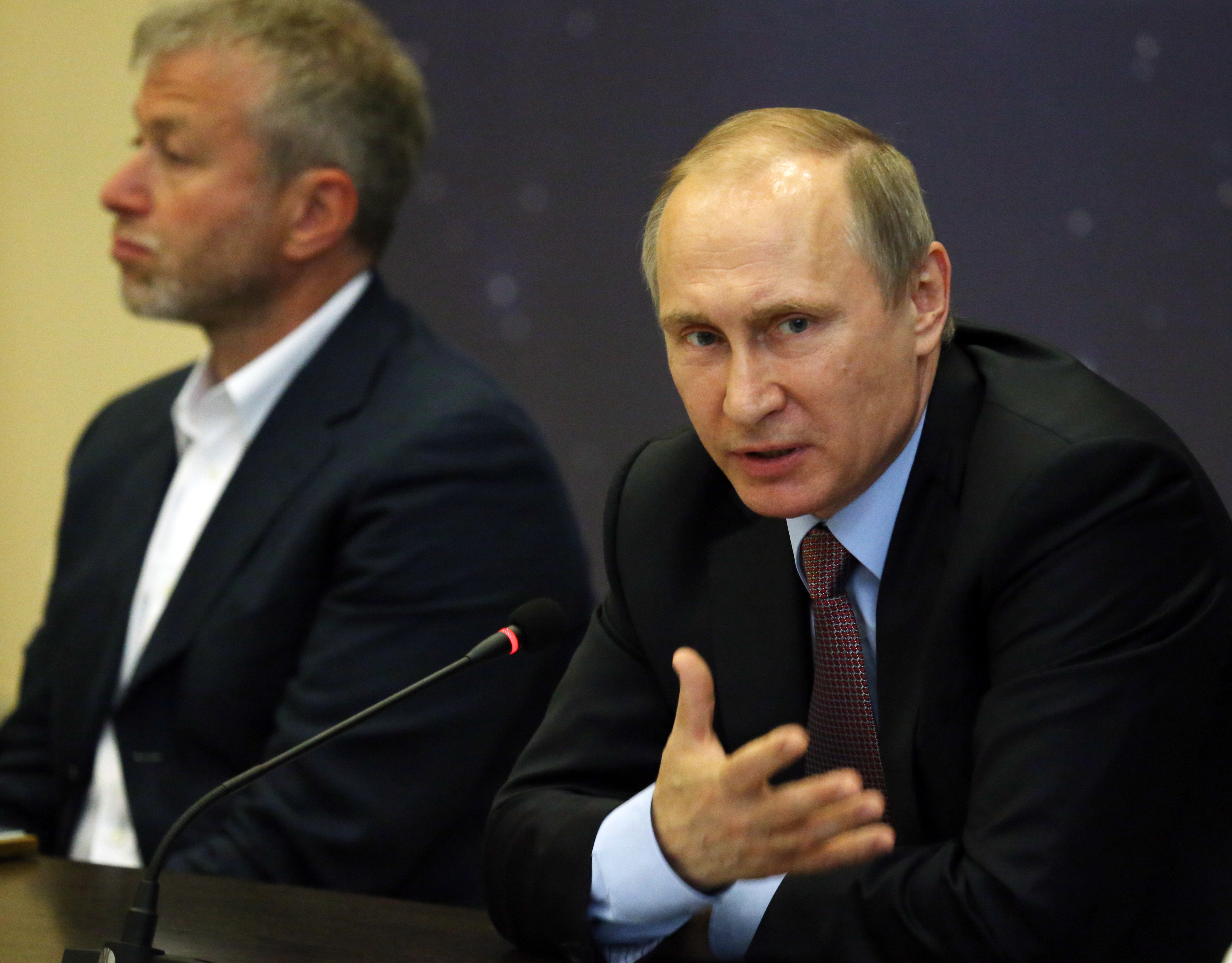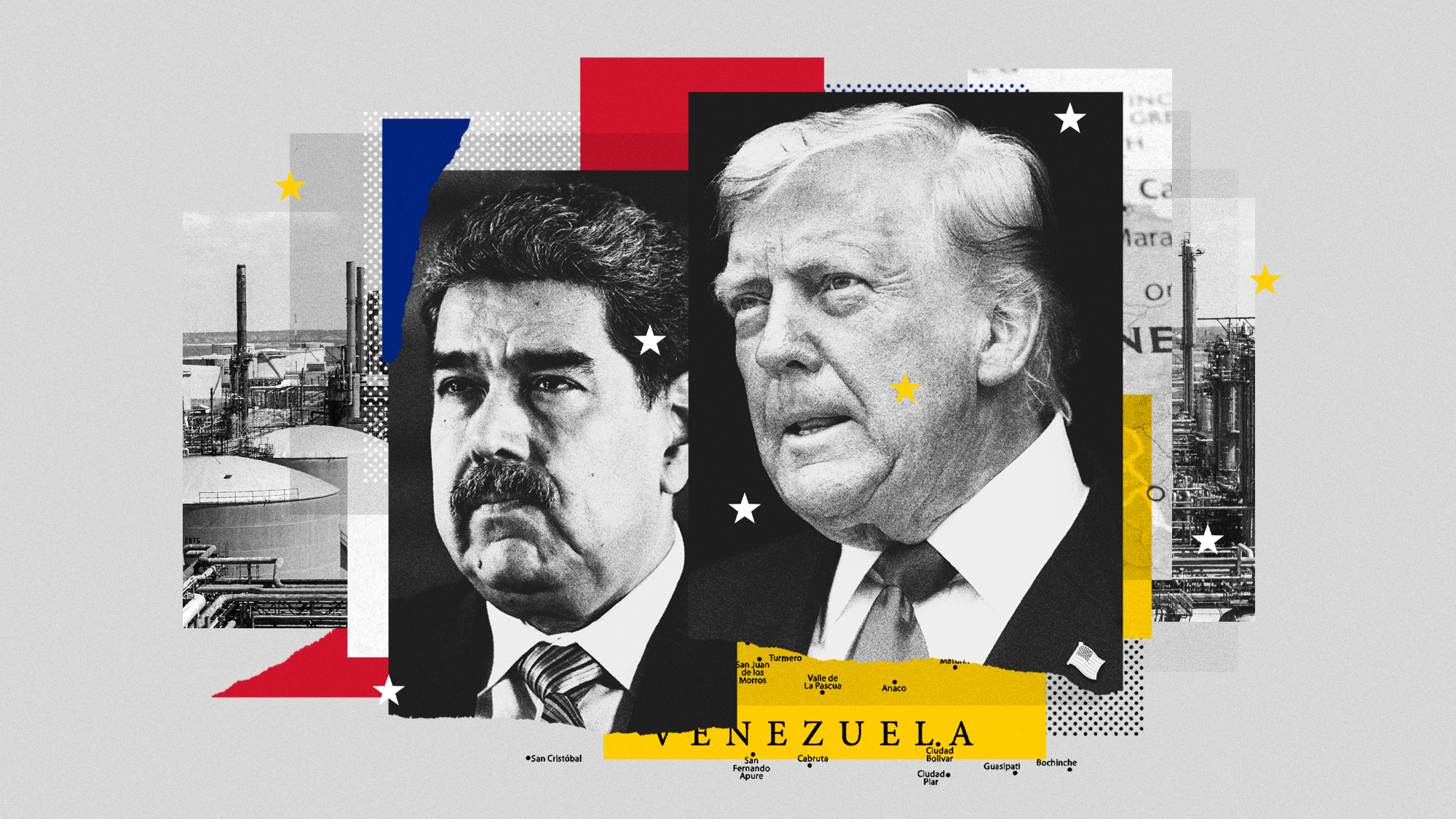How did Russia's oligarchs become so powerful?
The U.S. and its allies are going after the assets of Russia’s billionaires. Will sanctioning them hurt Putin?

A free daily email with the biggest news stories of the day – and the best features from TheWeek.com
You are now subscribed
Your newsletter sign-up was successful
The U.S. and its allies are going after the assets of Russia's billionaires. Will sanctioning them hurt Putin? Here's everything you need to know:
Who are the oligarchs?
They're the dozens of ultrawealthy Russians who schemed and swindled their way to control of Russia's most lucrative industries. The term "oligarch" was coined by Aristotle, but became popular in the 1990s, when a handful of entrepreneurs and hustlers took advantage of the sudden privatization of the Soviet economy to buy up natural resources and formerly state-controlled assets, using rigged auctions and other tricks. A few even took control of companies based on ownership documents they'd produced on home printers. This first-generation — most prominently Roman Abramovich, Mikhail Khodorkovsky, Boris Berezovsky, and four others — became the country's chief power brokers, essentially buying President Boris Yeltsin's 1996 election win for him. Vladimir Putin succeeded Yeltsin in 2000 in part through promises to "eliminate oligarchs as a class," but that didn't happen. A 2017 study conducted by the U.S.-based National Bureau of Economic Research found that Russia's wealthiest elite had at least $800 billion stashed abroad — roughly equal to the total wealth of Russia's remaining 144 million people.
The Week
Escape your echo chamber. Get the facts behind the news, plus analysis from multiple perspectives.

Sign up for The Week's Free Newsletters
From our morning news briefing to a weekly Good News Newsletter, get the best of The Week delivered directly to your inbox.
From our morning news briefing to a weekly Good News Newsletter, get the best of The Week delivered directly to your inbox.
What did Putin do?
The ex-KGB officer wrested control of Russia's corporations and wealth from the seven biggest oligarchs. He triggered a prosecution and imprisonment of oil tycoon Khodorkovsky and forced two others, Vladimir Gusinsky and Berezovsky, into exile. (Berezovsky would die under suspicious circumstances 10 years later.) By using state contracts like fiefs, Putin cobbled together a new, more tightly controlled oligarch class from old St. Petersburg friends, fellow KGB alumni, and other members of the siloviki — the state security, police, and military elite. By 2009, according to a paper published by intelligence firm Stratfor, 78 percent of Russian business and government leaders had ties to security organs, including the FSB, the KGB's successor agency. This group is extremely loyal to Putin, largely sharing his grudges about Russia's failed experiment with economic liberalization and his paranoia about the West.
How has the West responded?
The U.S. is currently sanctioning more than 400 Russians and is looking into the finances of at least 50 oligarchs and Putin cronies. One chief target of U.S. and European Union sanctions is Igor Sechin, Putin's onetime secretary who owns oil giant Rosneft and is widely considered Russia's second most powerful man. Others singled out include brothers and construction magnates Arkady and Boris Rotenberg, as well as restaurateur Yevgeny Prigozhin, who helps fund the notorious St. Petersburg troll farm that spread disinformation during and after the 2016 U.S. presidential election. The U.S., U.K., and EU have seized or blocked movements of at least nine multimillion-dollar superyachts, including those belonging to Sechin, metals tycoon Alisher Usmanov, and Gennady Timchenko, owner of an energy-trading firm. In his recent State of the Union address, President Biden announced the creation of a new Justice Department task force charged with hunting down Russian billionaire assets. "We are joining with our European allies to find and seize your yachts, your luxury apartments, your private jets," he said.
A free daily email with the biggest news stories of the day – and the best features from TheWeek.com
Is that making a difference?
Post-invasion economic disruptions have cost Russia's 20 richest billionaires about a third of their wealth, according to the Bloomberg Billionaires Index. But the U.S. faces major logistical hurdles in its attempts to punish individuals. Because government investigators must establish a link to criminality in the U.S. to actually seize domestic Russian assets, it can take years to build a case — or even prove ownership, as oligarchs conceal their holdings in layers upon layers of shell companies scattered throughout the world. And researchers warn that even the most punishing sanctions are unlikely to make oligarchs take the risk of pressuring the autocratic Russian president to change course on Ukraine. "It's not the 1990s," said Tufts political science professor Daniel Drezner. "These are people who owe their position to Putin."
So are these efforts useless?
No. Draining the coffers of Putin's bankrollers will make the invasion more difficult to sustain and clarify what future costs they will face for continuing to fund his bloody aggression abroad. Unease is growing among the Russian elite, particularly among those with foreign residences and passports. Banker Mikhail Fridman and aluminum magnate Oleg Deripaska, both targets of Western sanctions, have publicly called for an end to the war. But University of South Carolina professor Stanislav Markus, a specialist on the oligarchs, warns that imposing further sanctions on these highly visible globe-trotters will probably not accomplish much. Instead, they should more precisely target the "silovarchs" — those with a presence in the state security and military apparatus as well as the boardroom. "It is the guns, not the money," he said, "that speak loudest in the Kremlin today."
Putin's hidden treasure
Putin is widely rumored to be the richest man on earth, but little of his wealth shows up on paper. The Kremlin claims that Putin makes a $140,000 yearly salary and owns three cars, a camping trailer, and an 800-square-foot apartment in St. Petersburg. But in 2017 testimony for the Senate Judiciary Committee, financier Bill Browder claimed Putin more likely had about $200 billion in assets. Browder, a onetime investor inside Russia, claimed that Putin blackmailed the oligarchs for half of their wealth after jailing Khodorkovsky for fraud and tax evasion. Other observers have pointed to Putin's $500,000 German-made wristwatch, $716 million flying fortress, and multiple megayachts. Last year, now-jailed activist Alexei Navalny released a documentary alleging that Putin also owns a 190,000-square-foot, $1.4 billion mansion on a cliff overlooking the Black Sea; it includes a marble swimming pool lined with statues of Greek gods, an ice-hockey rink, a nightclub with stripper poles, and bathrooms with $1,250 toilet-paper holders. Arkady Rotenberg later claimed to be the mansion's owner, but Russia experts believe that Putin has dispersed and hidden his riches among oligarch caretakers, shell companies, and real estate holdings. Exiled Russian billionaire Sergei Pugachev, who once served as Putin's banker, has argued that determining what the dictator owns is impossible. "Everything that belongs to the territory of the Russian Federation," Pugachev said, "Putin considers to be his."
This article was first published in the latest issue of The Week magazine. If you want to read more like it, you can try six risk-free issues of the magazine here.
-
 Bad Bunny’s Super Bowl: A win for unity
Bad Bunny’s Super Bowl: A win for unityFeature The global superstar's halftime show was a celebration for everyone to enjoy
-
 Book reviews: ‘Bonfire of the Murdochs’ and ‘The Typewriter and the Guillotine’
Book reviews: ‘Bonfire of the Murdochs’ and ‘The Typewriter and the Guillotine’Feature New insights into the Murdoch family’s turmoil and a renowned journalist’s time in pre-World War II Paris
-
 Witkoff and Kushner tackle Ukraine, Iran in Geneva
Witkoff and Kushner tackle Ukraine, Iran in GenevaSpeed Read Steve Witkoff and Jared Kushner held negotiations aimed at securing a nuclear deal with Iran and an end to Russia’s war in Ukraine
-
 ‘The forces he united still shape the Democratic Party’
‘The forces he united still shape the Democratic Party’Instant Opinion Opinion, comment and editorials of the day
-
 Trump’s ‘Board of Peace’ comes into confounding focus
Trump’s ‘Board of Peace’ comes into confounding focusIn the Spotlight What began as a plan to redevelop the Gaza Strip is quickly emerging as a new lever of global power for a president intent on upending the standing world order
-
 The billionaires’ wealth tax: a catastrophe for California?
The billionaires’ wealth tax: a catastrophe for California?Talking Point Peter Thiel and Larry Page preparing to change state residency
-
 Trump considers giving Ukraine a security guarantee
Trump considers giving Ukraine a security guaranteeTalking Points Zelenskyy says it is a requirement for peace. Will Putin go along?
-
 What have Trump’s Mar-a-Lago summits achieved?
What have Trump’s Mar-a-Lago summits achieved?Today’s big question Zelenskyy and Netanyahu meet the president in his Palm Beach ‘Winter White House’
-
 Bari Weiss’ ‘60 Minutes’ scandal is about more than one report
Bari Weiss’ ‘60 Minutes’ scandal is about more than one reportIN THE SPOTLIGHT By blocking an approved segment on a controversial prison holding US deportees in El Salvador, the editor-in-chief of CBS News has become the main story
-
 Why, really, is Trump going after Venezuela?
Why, really, is Trump going after Venezuela?Talking Points It might be oil, rare minerals or Putin
-
 Moscow cheers Trump’s new ‘America First’ strategy
Moscow cheers Trump’s new ‘America First’ strategyspeed read The president’s national security strategy seeks ‘strategic stability’ with Russia